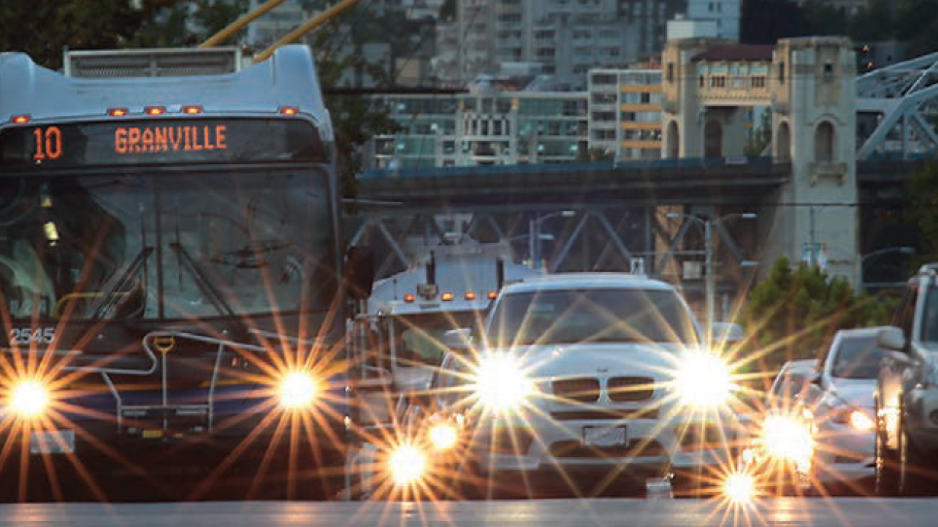Vancouverites have long been under the impression the city has one of the worst rates of traffic congestion in the world, but a new study has found this may not actually be the case.
The new report, the INRIX Global Traffic Scorecard, has ranked Vancouver 157th worldwide in terms of traffic congestion. This contradicts the TomTom Traffic Index—which has been around for six years—which has Vancouver as the 34th most congested city on the planet and has been covered extensively by local media as far back as 2000. The INRIX ranking doesn’t even have Vancouver as the most congested city in Canada, instead ranking it fifth behind Montreal (27th overall in the world), Toronto (53rd), St. John’s (144th) and Ottawa (150th).
INRIX, a Kirkland, Washington-based transportation analytics company, analyzed traffic congestion in 1,064 cities for its second annual report. Its methodology calculates congestion at different times of the day in different parts of a city using 500 terabytes of data from 300 million different sources covering over five million miles of road. The Amsterdam-based TomTom Traffic Index’s methodology is based on reported increases in overall travel times as opposed to free-flow situations, which in turn is based on GPS reports from TomTom’s historical traffic database.
The two studies offer stark contrasts to how congestion should be calculated, as none of the top ten cities on TomTom’s list appear on INRIX’s top ten.
Brent Toderian, an urban planning consultant and former chief planner for the City of Vancouver, said he’s been calling the TomTom ranking into question since its inception. He said at first glance, the INRIX rankings appear more comprehensive.
“I’ve looked at the TomTom rankings every year, and I’ve been asked to comment on the TomTom rankings every year, and I’ve said that the TomTom’s methodology is flawed every year,” he said.
“And the TomTom analysis has been successful every year [at getting] media attention for TomTom.”
Toderian said Vancouver is improperly ranked highly because TomTom’s methodology favours cities that have freeways.
Steve Brown, the manager of traffic and data management for the City of Vancouver, said a big part of what his department is doing right now is trying to find the best way to “define” congestion.
“You have to look at people’s expectations when it comes to congestions as well,” he said.
Brown said his department is preparing a report that will be presented to city council in May and that the key for Vancouver to continue to relieve congestion lies in creating alternative transportation methods to automobile trips.
“Over the last few years, we have seen a lot more concerns over congestion,” he said. “And because we’re kind of falling behind on some of our transit infrastructure investments, we’re seeing that there are tending to be more trips lately relying on the road network.”
Brown said Vancouver must look to alternatives such as walking, bicycling and increased public transportation options if it wants to reduce congestion.
“We can’t expand the amount of roads that we have,” he said. “But what we could do is move people more efficiently.”
Last year, Langley City councillor Nathan Pachal compiled the 2016 Transit Report Card of Major Canadian Regions. He gave Vancouver a high ranking in terms of public transportation—second only to Montreal—using Canada Transit’s Fact Book 2014 Operating Data by the Canadian Urban Transit Association, which gathers its data from transit agencies across the country and Statistics Canada’s National Household Survey. Pachal also called into question the accuracy of the TomTom rankings. He said during the transit referendum in 2015, discussion around congestion in Vancouver reached a fever pitch.
“You had a lot of misinformation swirling around,” he said.
INRIX Global Traffic Index Scorecard:
- Los Angeles
- Moscow
- New York
- San Francisco
- Bogota, Colombia
- Sao Paolo, Brazil
- London, England
- Magnitogorsk, Russia
- Atlanta
- Paris, France
TomTom Traffic Index ranking:
- Mexico City
- Bangkok, Thailand
- Jakarta, Indonesia
- Chongqing, China
- Bucharest, Romania
- Istanbul, Turkey
- Chengdu, China
- Rio de Janeiro, Brazil
- Beijing, China
- Changsha, China




